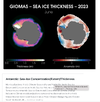- Joined
- 28 May 2020
- Posts
- 6,744
- Reactions
- 12,986
Many will argue with that.Yep. The earths climate has gone through many changes. The PETM period would have been one period that resulted in mass extinctions because of the very sharp increases in temperature.
The Medieval Warm period? Yes a warm time but on known records certainly not as warm as current temperatures.

Medieval Period Was Warmer Than Expected - Antarctica Journal
One of the most common arguments of those skeptical of global warming is that the Medieval Warm Period (800-1400 AD) was as warm as or warmer than today. Using this as proof to say that we cannot be the cause of current global warming is a faulty notion based upon rhetoric rather than science...www.antarcticajournal.com
Here are four articles that suggest that the Medieval period was indeed warmer than today.
Springer
Nature This one used Coral Cores to work out its results - How Topical.
Cambridge
AGU
I would also note that until that charlatan Michel Mann came up with his Hockey Stick, the IPCC had the MWP as warmer than today.
But then subsequent versions managed to eliminate it.
Mick








